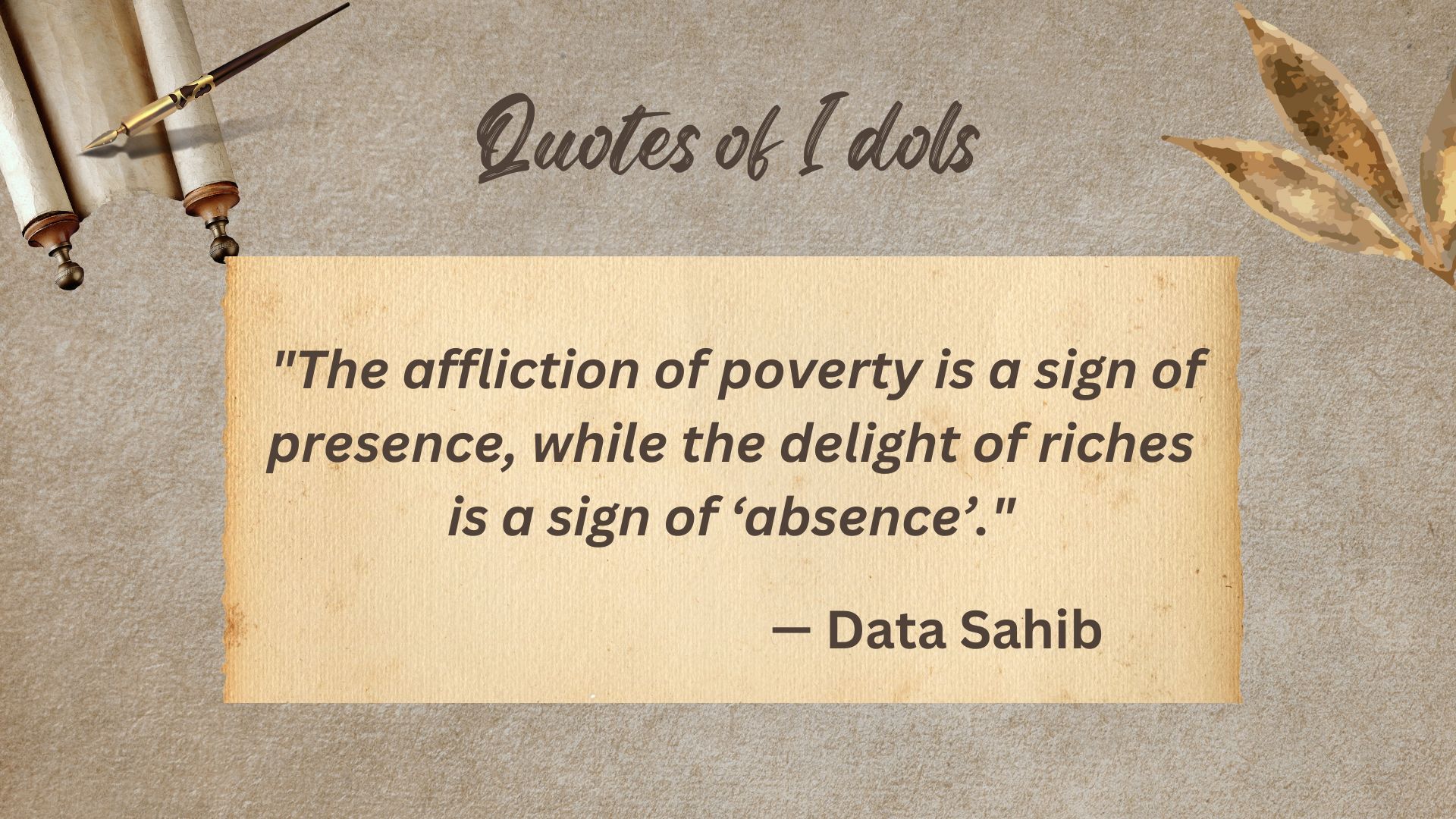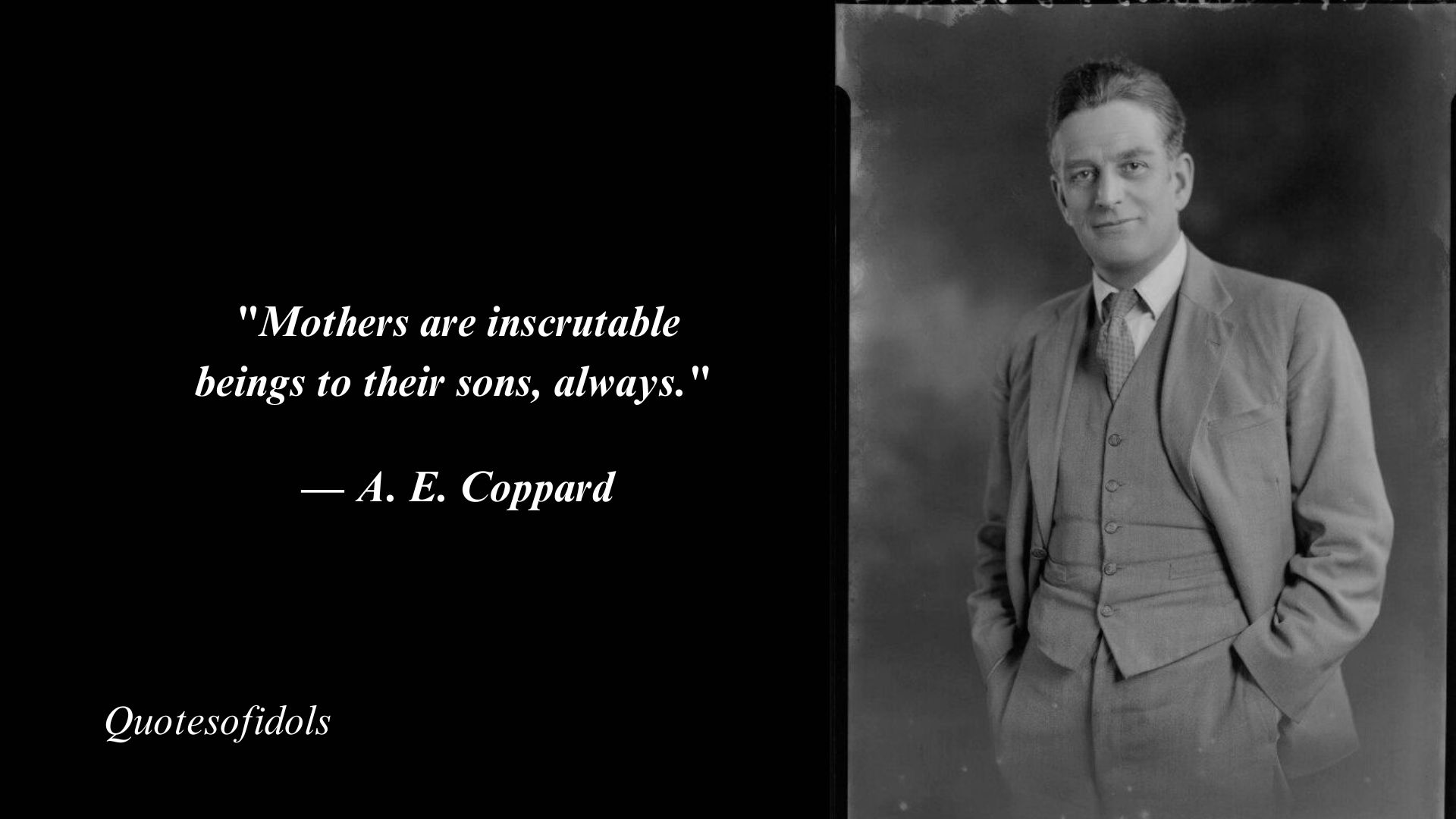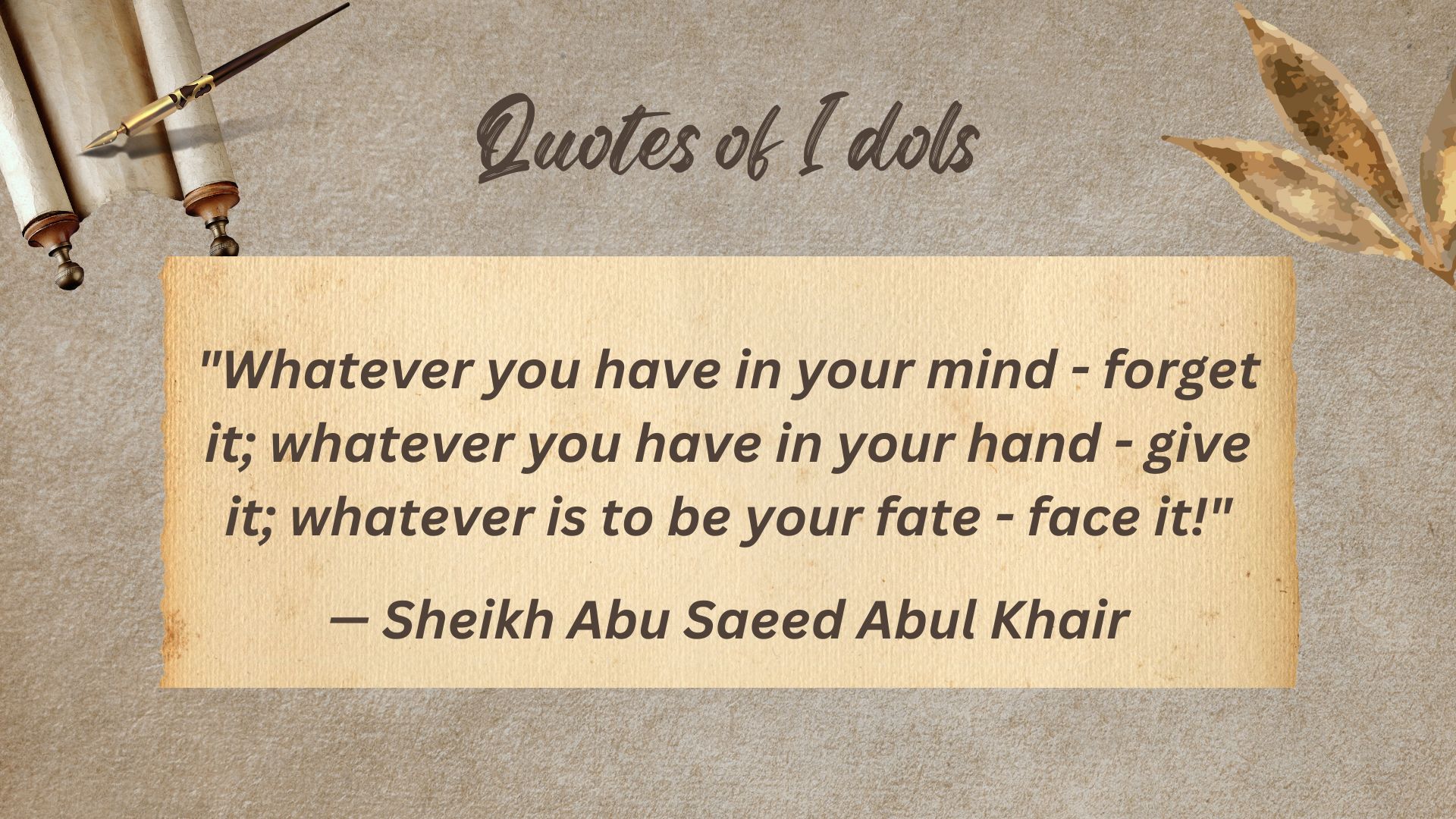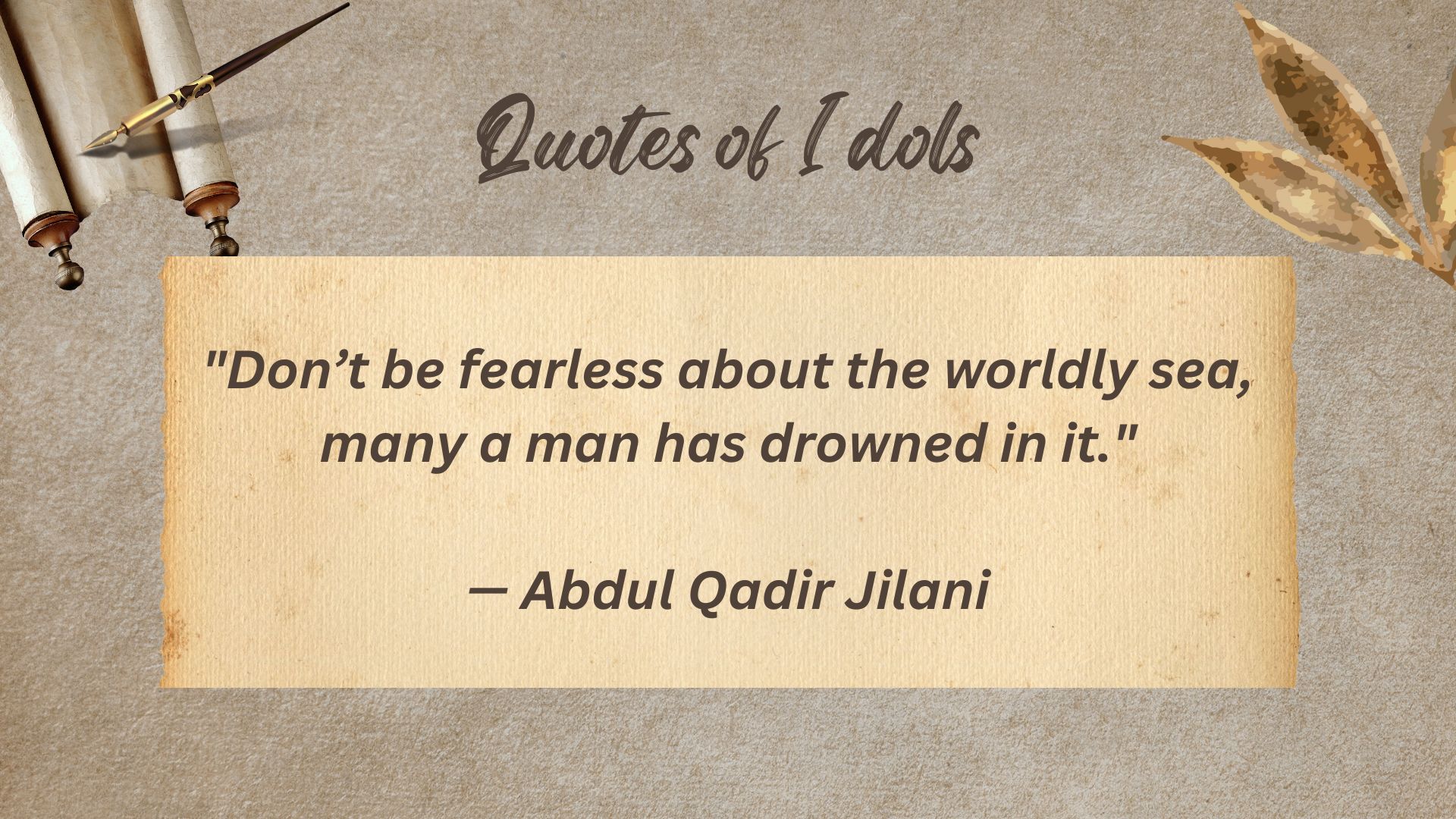All Time Famous Quotes of Data Sahib

Data Sahib, also known as Hazrat Data Ganj Bakhsh Ali Hajveri, was an influential Sufi saint and scholar in the 11th century, born in Ghazni, Afghanistan, and later residing in Lahore, Pakistan. Renowned in the Punjab region, he authored the seminal Sufi text “Kashf al-Mahjub” (Unveiling of the Hidden), which remains pivotal in Sufi literature. Data Sahib’s teachings emphasized love, devotion, and spiritual enlightenment under the guidance of a master. He attracted a large following of disciples and devotees. The shrine of Data Sahib in Lahore is a significant pilgrimage site, symbolizing religious harmony and visited by people of diverse faiths seeking blessings and spiritual solace. His teachings continue to inspire millions in South Asia, fostering love, tolerance, and the pursuit of inner peace, transcending cultural and religious boundaries.
Data Sahib Quotes
01. “Once Ibrahim Adham saw a stone on which was written – ‘turn me over and read.’ On the other side, he read – ‘you do not practice what you know, why then do you seek what you know not?'”
— Data Sahib
02. “Many shaikhs observe the following rule. When a novice joins them, they subject him to the spiritual discipline for three years. He can be admitted to the path only if he fulfills all the requirements of this discipline. The first year is devoted to the service of the people, the second year to the service of God, and the third year to watching over his own heart.”
— Data Sahib
03. “The term ‘Sufi’ has no derivation answering to etymological requirements inasmuch as Sufism is too exalted to have any genus from which it might be derived.”
— Data Sahib
04. “A saint is known only to a saint.”
— Data Sahib
05. “God alone can help a man to do good deeds.”
— Data Sahib
06. “Unless God exerts Himself towards a man, that man’s exertion is of no use.”
— Data Sahib
07. “Marriage is proper for those who prefer to associate with mankind, and celibacy is an ornament for those who seek retirement from mankind.”
— Data Sahib
08. “Dervishhood in all its meanings is a metaphorical poverty, and amidst all its subordinate aspects, there is a transcendent principle.”
— Data Sahib
09. “This world is the abode of trouble, the pavilion of affliction, the den of sorrow, the house of parting, and the cradle of tribulation.”
— Data Sahib
10. “Prayer requires purification of the body; gnosis requires purification of the heart.”
— Data Sahib
11. “The glory of poverty is this, that the poor man’s body is divinely preserved from base and sinful acts, and his heart from evil and contaminating thoughts.”
— Data Sahib
12. “Formerly, the practice of Sufism was known and the pretense unknown; nowadays the pretense is known, and the practice is unknown.”
— Data Sahib
13. “In the mystic path, he who says ‘I have arrived’ has gone astray.”
— Data Sahib
14. “Man, enamored of his gross environment, remains sunk in ignorance and apathy, making no attempt to cast off the veil that has fallen upon him.”
— Data Sahib
15. “Divine guidance involves self-mortification without which contemplation is unattainable.”
— Data Sahib
16. “Humanity is the greatest barrier that separates man from Divinity.”
— Data Sahib
17. “All human actions and inactions are the act and creation of God.”
— Data Sahib
18. “The spiritual path is hard to travel except for those who were created for the purpose.”
— Data Sahib
19. “Saintship is a divine mystery that is revealed only through conduct.”
— Data Sahib
20. “Gnosis is realized when its true nature is divinely revealed.”
— Data Sahib
21. “God has saints whom He has distinguished by His friendship.”
— Data Sahib
22. “When a man is satisfied with God’s decrees, it is a sign that God is satisfied with him.”
— Data Sahib
23. “Gnosis when sought by effort is a shackle and a veil.”
— Data Sahib
24. “Although hunger is an affliction to the body, it illumines the heart, purifies the soul, and leads the spirit into the presence of God.”
— Data Sahib
25. “The Divine knowledge penetrates what is hidden and comprehends what is manifest.”
— Data Sahib
26. “Poverty has a form and an essence. Its form is destitution and indigence, but its essence is fortune and free choice.”
— Data Sahib
27. “The highest pinnacle of knowledge is expressed in the fact that without it none can know God.”
— Data Sahib
28. “The affliction of poverty is a sign of presence, while the delight of riches is a sign of ‘absence’.”
— Data Sahib
29. “When you have obtained knowledge of the lower soul, you recognize that it can be controlled by discipline, but that its essence and substance do not perish.”
— Data Sahib
30. “Anyone who pretends to know God without lowliness and fear is an ignorant fool, not gnostic.”
— Data Sahib
31. “Seeking is the cause of finding, but finding is the cause of seeking.”
— Data Sahib
32. “A miracle is a token of a saint’s veracity, and it cannot be manifested to an imposter except as a sign that his pretensions are false.”
— Data Sahib
33. “Eternal life is gained by spiritual sacrifice and by renunciation of self-interest in fulfilling God’s commandments.”
— Data Sahib
34. “Love is an attribute of the beloved; therefore, no explanation of its real nature is possible.”
— Data Sahib
35. “There is no flame of lust that cannot be extinguished by strenuous effort because when vice proceeds from yourself, you possess the instrument that will remove it.”
— Data Sahib
36. “The miracles of a saint confirm the evidence of the prophet.”
— Data Sahib
37. “The way to God is like the blazing sun.”
— Data Sahib
38. “The essence of Sufism involves the annihilation of human qualities.”
— Data Sahib
39. “The Sufi is entirely present: his soul is where his body is, and his body where his soul is, and his soul where his foot is, and his foot where his soul is.”
— Data Sahib
40. “Knowledge and action cannot be divorced in any way, just as the light of the sun cannot be separated from the sun itself.”
— Data Sahib
41. “Knowledge of God is the science of gnosis; knowledge from God is the science of the sacred Law, and knowledge with God is the science of the Sufi path.”
— Data Sahib
42. “A man is united to God when God holds him in honor, and separated from God when God holds him in contempt.”
— Data Sahib
43. “Faith and gnosis are love, and obedience is a sign of love.”
— Data Sahib
44. “The animal soul is the greatest of all veils between God and man.”
— Data Sahib
45. “Mortification stands in the same relation to contemplation as Divine blessing to obedience.”
— Data Sahib
46. “The true object of pilgrimage is not to visit the Kaaba, but to obtain contemplation of God.”
— Data Sahib
47. “Religion is the root, and Sufism is the branch.”
— Data Sahib
48. “Lust is our shackle, and sin is our chain.”
— Data Sahib
49. “Unless Divine protection is predestined to a man, he cannot abstain from anything by his exertion”
— Data Sahib









